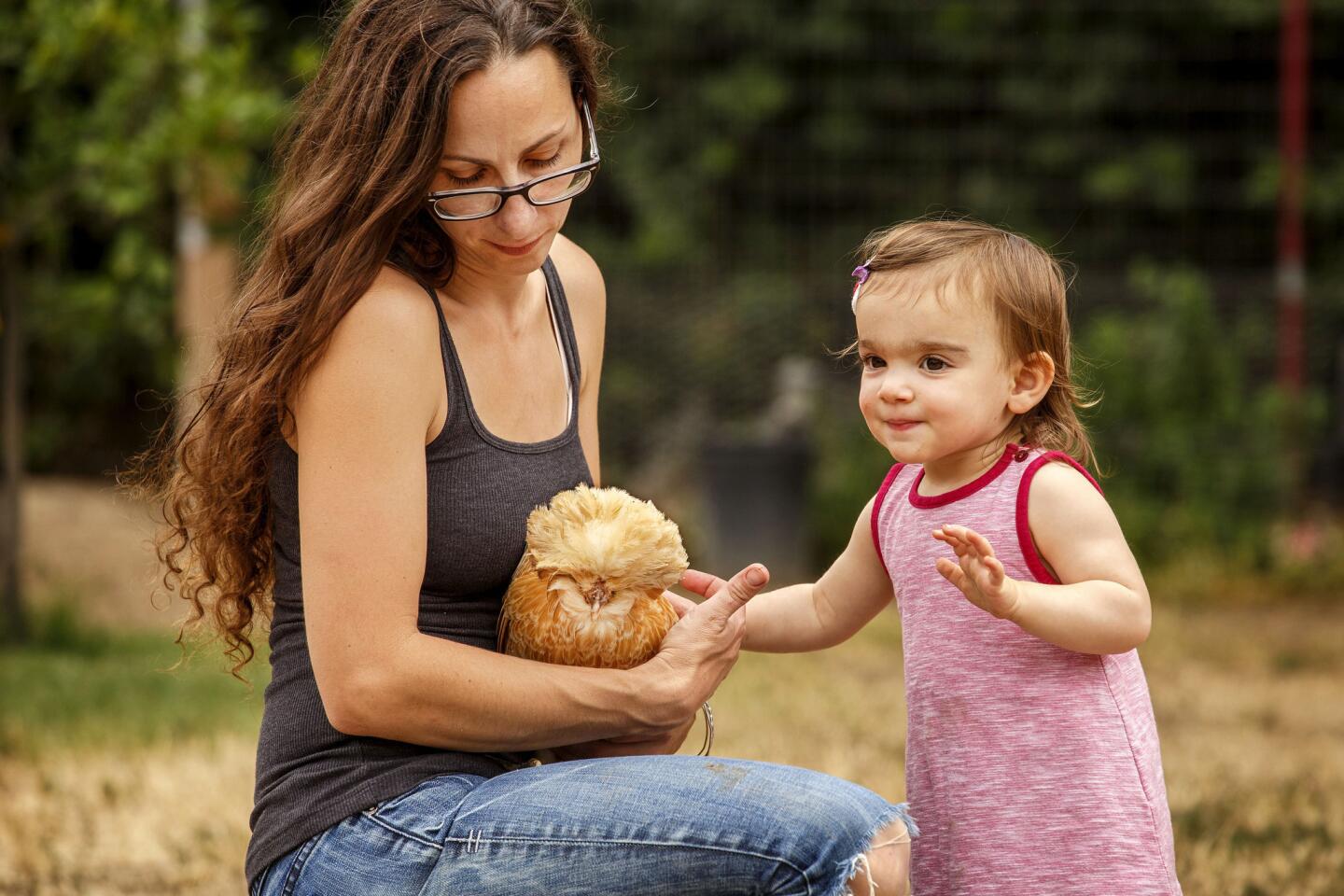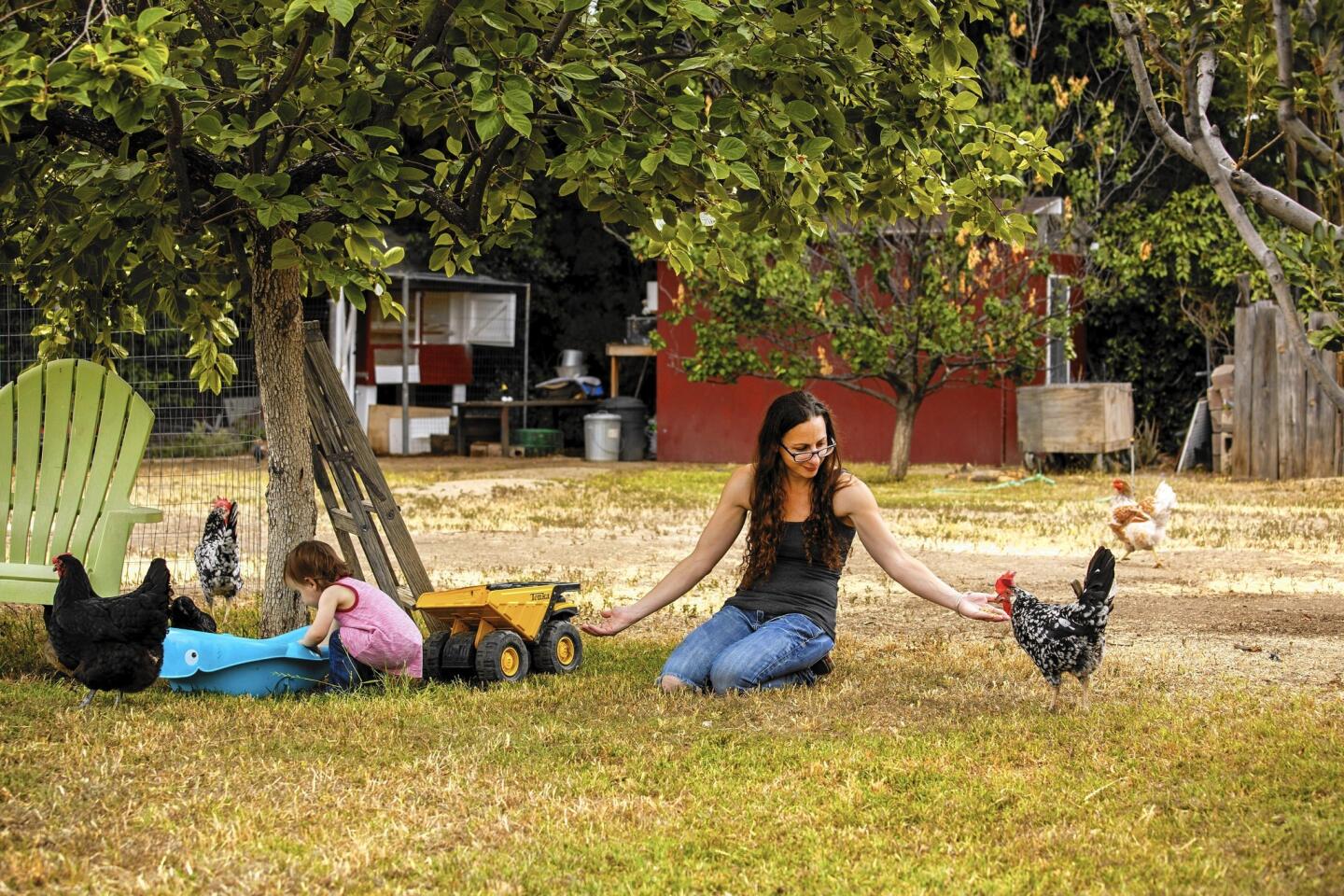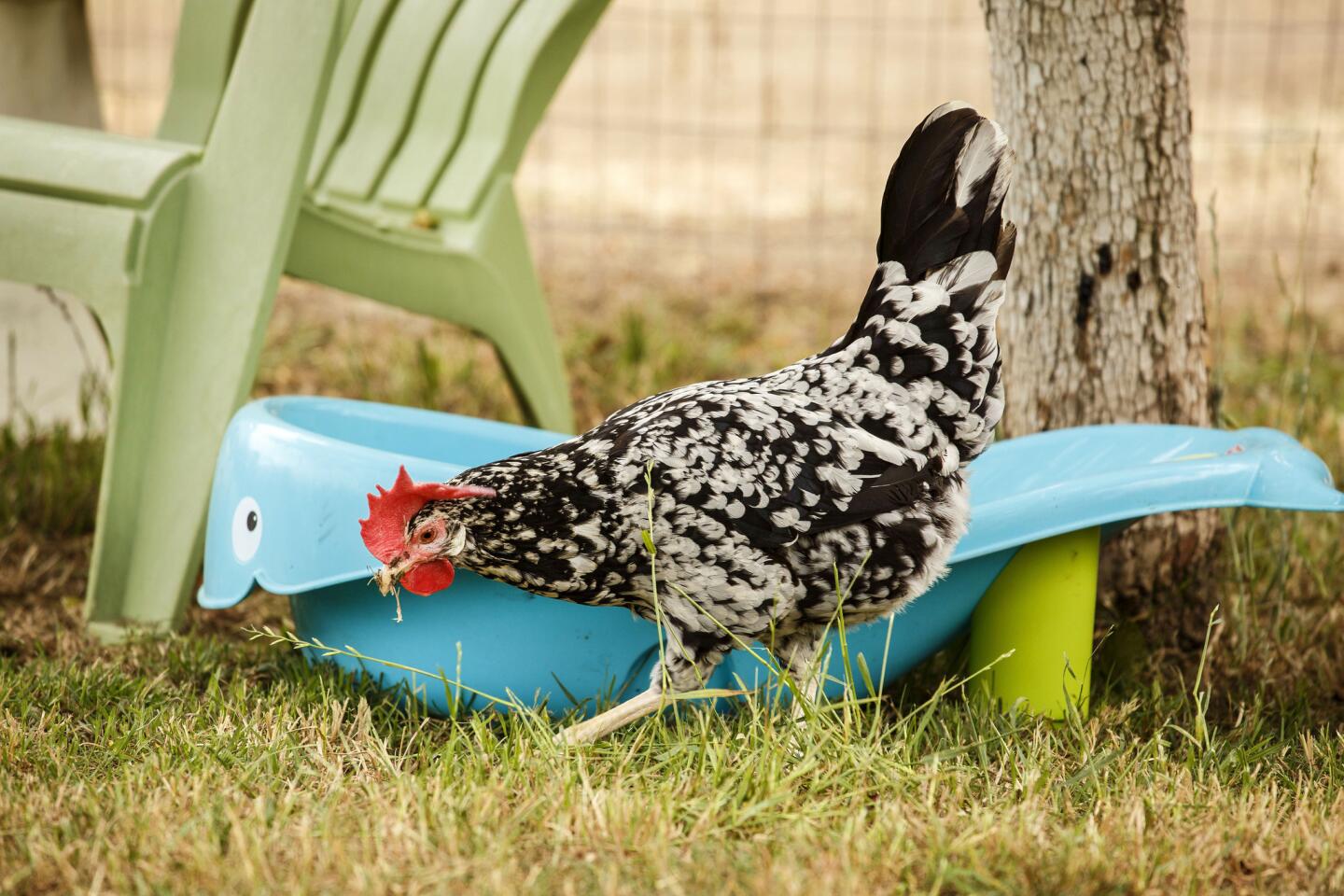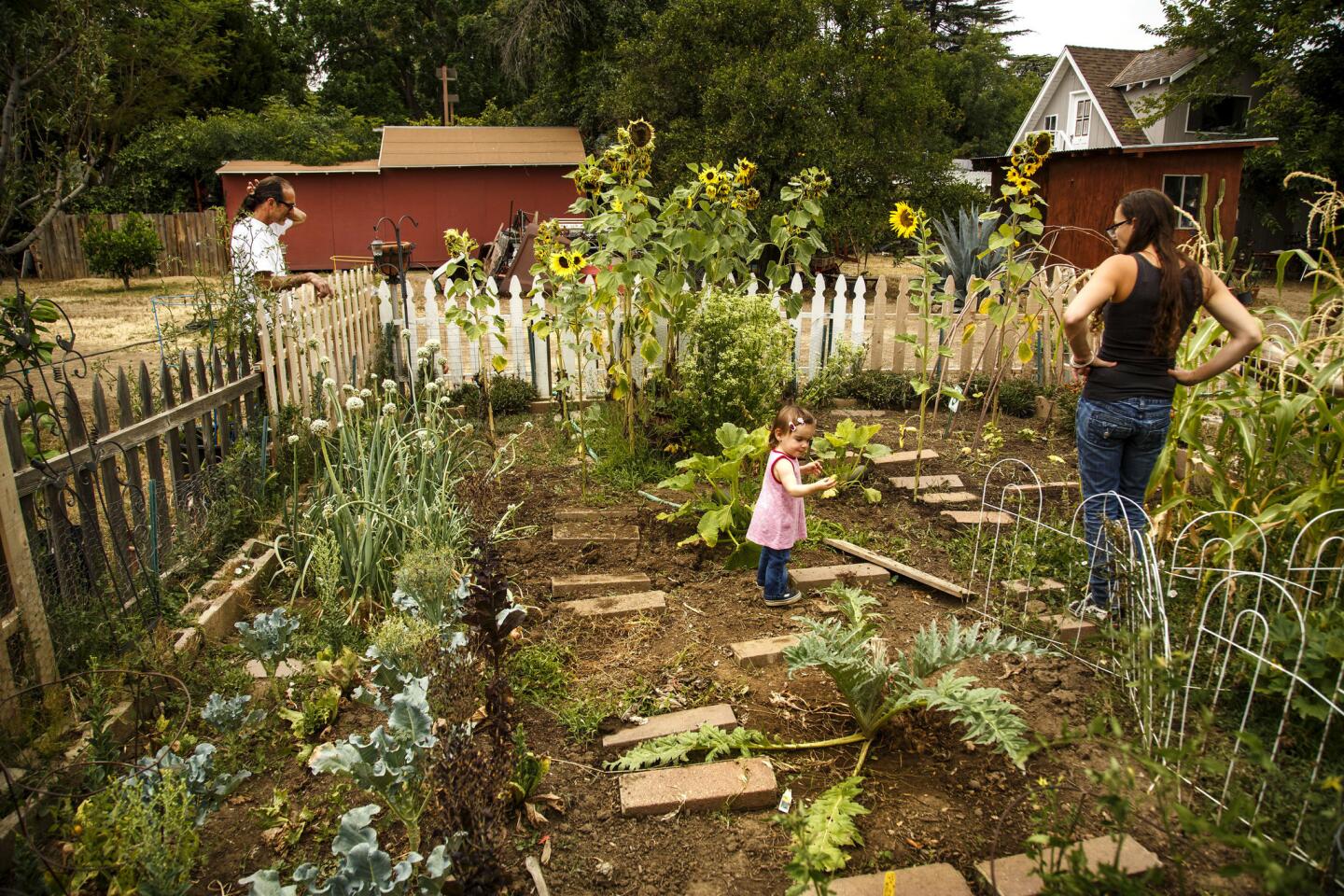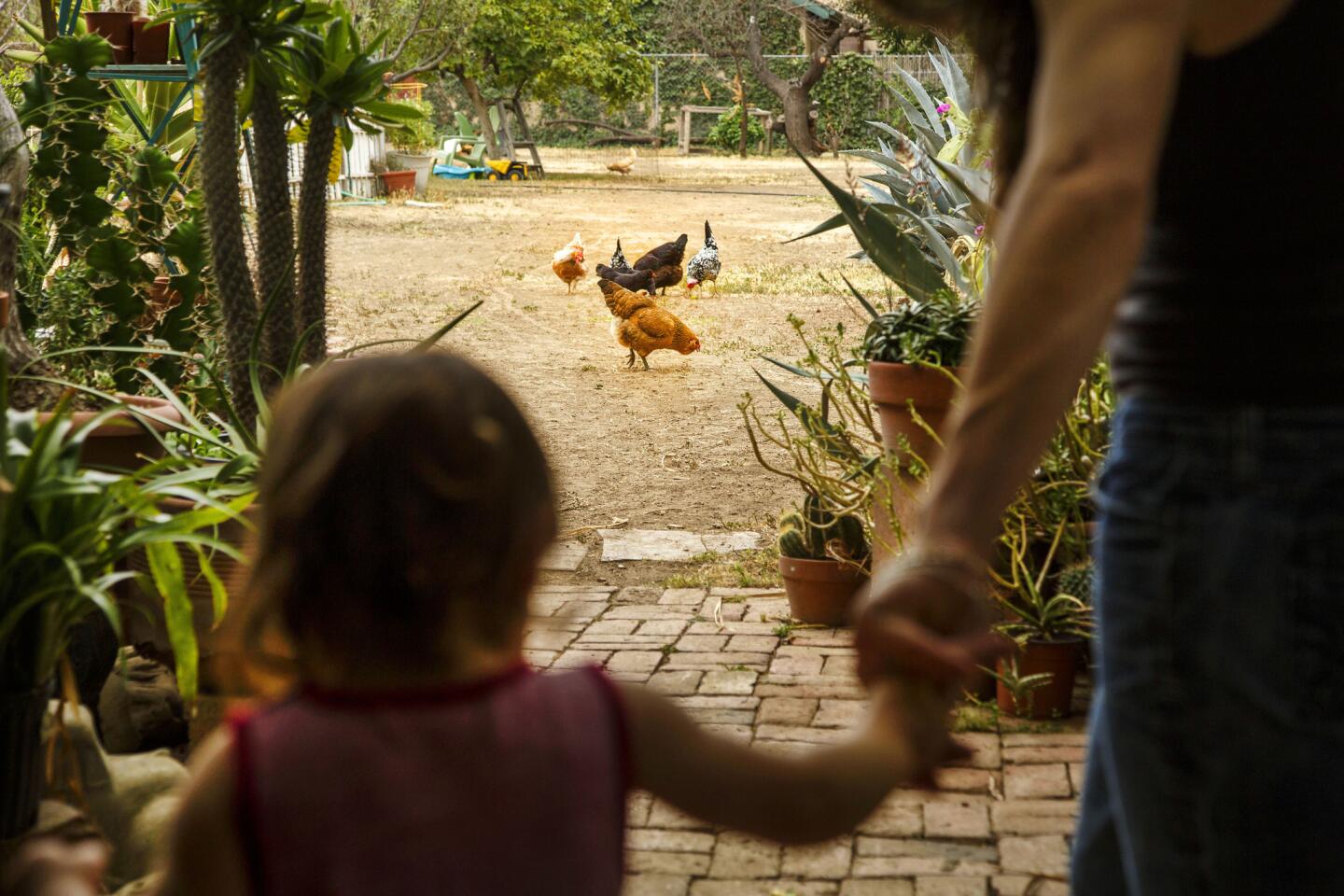More city dwellers are embracing ‘hobby farms’: ‘It’s like we live in the country’
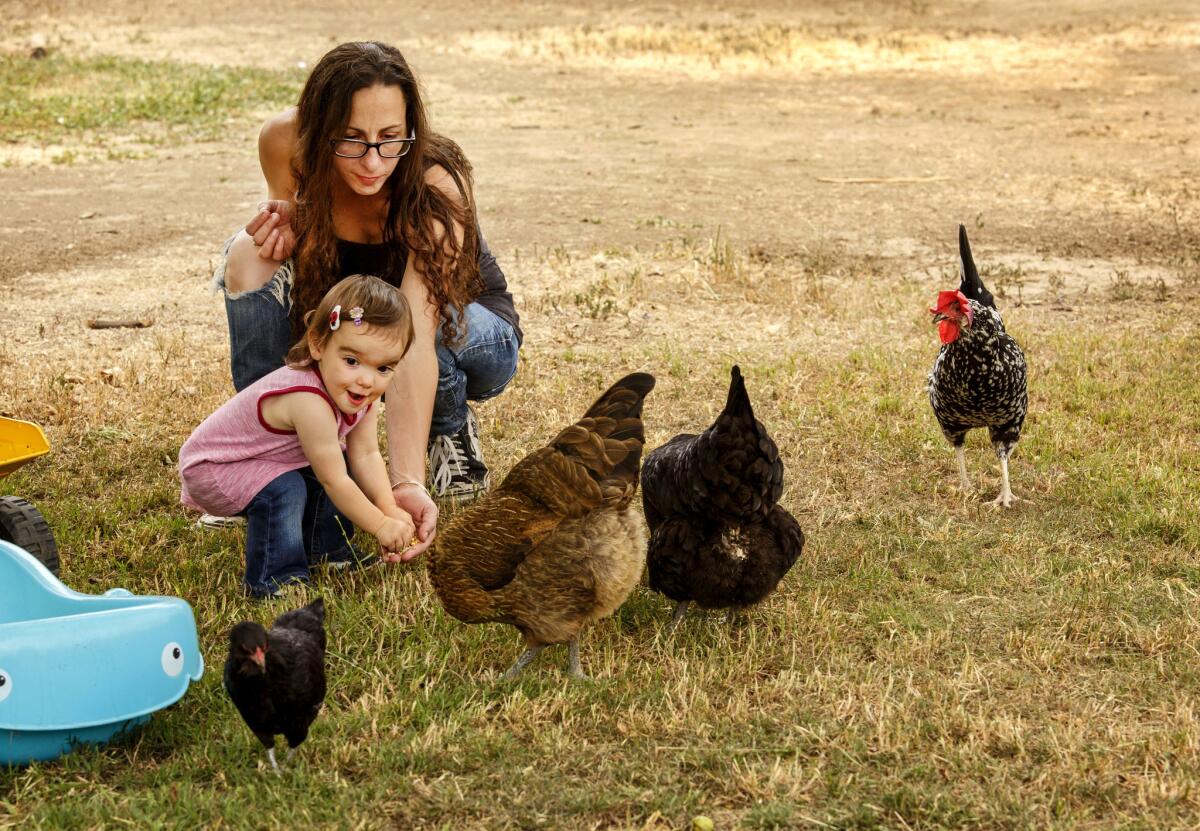
Dominique Salamone and daughter Glory feed chickens in their backyard.
About an hour before the start of a spring storm, Dominique Salamone surveyed her three-quarter-acre Northridge yard and commenced an impromptu master class in suburban chicken raising.
“You have to be committed,” she said. “Raising livestock takes time and knowledge. And it helps to have a handy spouse.”
The former sheet-metal factory forewoman apologized for the overgrown vegetable garden as 12 hens and a small but feisty new rooster named Rudy moved freely around us.
Just blocks away, commuters were already getting caught in the beat-the-rain gridlock, but Salamone, who started keeping livestock in 2010, never abandoned the mantle of earth-mother-at-peace. Her hobby farm, she said, gives her a sense of purpose — and offers a more healthful alternative to red-meat dishes.
The daily bounty (up to a dozen eggs that come in a variety of colors, depending on the breed) and the satisfaction that comes from teaching her children, ages 1 and 5, about nature more than compensate for the time and upkeep (about $50 a month for bedding and food). And she can trade resources (natural fertilizer and her prized blue eggs) with friends and neighbors.
“The eggs are delicious, the chickens relax you,” she said, “and I like having something that gives back.”
In addition to chickens, today’s urban barnyards include goats, turkeys, potbellied pigs, cows and bees. And what distinguishes a so-called hobby farm from other animal-related enterprises? For IRS purposes, a hobby farm is a homestead run primarily for pleasure, not profit.
“The dividing line is when you start selling the products,” said Rachel A. Surls, sustainable food systems advisor for the University of California Cooperative Extension in Los Angeles County. “Once you start selling the produce, you are a farm and bound by a lot of rules and regulations.”
Some experts say hobby farms are on the rise. “We have definitely seen a resurgence in some forms of farming, some of it hobby farming,” said Ken Pellman, a spokesman for the Los Angeles County Department of Agricultural Commissioner, Weights and Measures.
Stacy McKenna, the secretary for the Los Angeles County Beekeepers Assn., said interest in backyard beekeeping and sustainability has helped increase membership from about 100 in 2009 to 600 today.
Retailers acknowledge the trend. Danny Finkelstein, who opened Chatsworth’s Valley Hive beekeeping supply and service store in May 2014 and filled two of three honey harvesting and beekeeping workshops in the fall, said a March workshop was a sellout.
“Business has been amazingly good,” he said. “It is normal in other countries for people to have their own food in their yard and their own bees. But we are seeing a rise in urban beekeepers.”
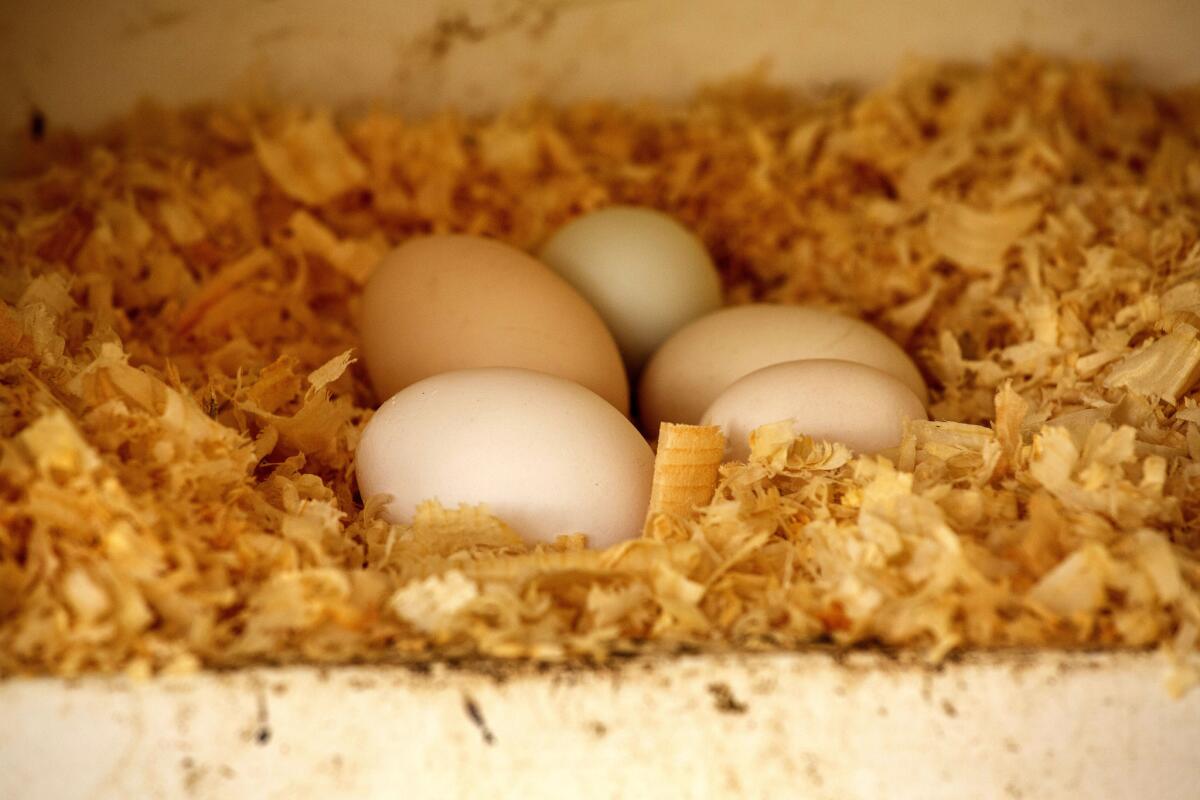
Robin Hoeflinger, a Newbury Park hobby farmer who has been selling animal feed products for eight years, said that “the poultry feed end of the business has grown hugely in the past two to three years, due to the backyard farmer.”
Hoeflinger said that “people want to know where their food is coming from.” She keeps five chickens on a third of an acre at an average cost of $35 a month.
Hoeflinger’s 15-year-old daughter, Kayla, gets the appeal. “It is a lot of work to take care of the animals and be responsible, but a lot of young people today don’t get to have that experience. I feel like I am accomplishing something. My friends think it is cool. And I think I might want a job with animals in the future and believe that these skills will help me with that.”
Donna Johanson, who lives in Camarillo, started out as a hobby farmer but has become something more: an entrepreneur. She bought two goats to source raw milk for her family’s six-acre home in 2004 and eventually started to experiment with goat milk soap in her kitchen. Now she runs Chivas Skin Care, which she founded with her daughter in 2009. Chivas has goat milk soap products in 85 stores nationwide and sold more than 25,000 bars of soap in 2014.
Johanson, who bought an additional, one-acre farm in Fillmore in 2010, has a menagerie that includes 12 goats, 9 chickens, three pigs, three tortoises and an 8-month-old Red Angus calf named Diva.
“I don’t want to sugarcoat things. We still work on the side. We are still growing,” Johanson said. “But I love my animals, and I never get tired of it because it always feels like Easter to me.”
Other hobby farmers echo her enthusiasm: “I live in the city,” Hoeflinger said, “but when I am at home, it’s like we live in the country.”
::
Want a hobby farm? Know your goals and study up
If you’re considering starting a hobby farm, be clear about your goals. Connect with other hobbyists. And do some research. “For example, it’s good to know that chickens can fly over the garden fence before your neighbor” finds out, Northridge hobby farmer Dominique Salamone said.
Also, be realistic about your limitations (physical or financial), goals (fresh eggs or milk) and abilities (trimming animal hooves). Mary Ellen McComb learned this lesson the hard way when she adopted two fat-tailed sheep to keep the weeds down at her Northridge home in 1993. An experienced hobby farmer, McComb, who got her first horse at 13, has kept everything from chickens to a potbellied pig. Still, she said, it was difficult to find someone to shear the sheep and trim their hooves. (She eventually got help at a local community college.)
Find out what tools you will need to buy to care for, shelter and breed your animals. Know your estimated costs (seven chickens, for example, would go through about 50 pounds of feed every month at a cost of about $30). Start small. And design housing with expansion options for growing animals.
Because farm animals can be smelly and noisy, Salamone said tolerant neighbors are a plus. And it’s a good idea to talk to them (to say nothing of your family members) about your plans ahead of time.
::
Find out if you can raise chickens, bees, goats and more in your area
Can you keep chickens in your backyard? Bees? Pygmy goats? Zoning rules and regulations about the care or breeding of animals in residential and agricultural zones vary:
In unincorporated areas, check with the Los Angeles County Department of Regional Planning. For information about L.A. County land use codes, select “Helpful Links.” Go to “L.A. County Code” and visit “Title 10 — Animals” for information about animal control, animal health and miscellaneous regulations. For information about permitted land use for residences, select “Helpful Links,” and visit “Title 22 Planning and Zoning.” Then, select “Division 1 Planning and Zoning,” “Chapter 22.20 Residential Zones” and section “22.20.070” of “Part 2 R-1 Single Family Residence Zone.”
In an incorporated city, check with your city hall or call 311 and ask to be routed to the department that handles small farm animals on residential property. Specific city laws supersede county laws, so check out your city’s website and ask questions.
Are you unclear about which jurisdiction has say over your property? Visit the Los Angeles County Department of Regional Planning’s Z-Net tool. Select your community in the drop-down menu. Find the “Search” box. Then enter an address, assessor parcel number or street intersection in the search box for information about your home’s zone. For additional information, call (213) 974-6411 or email [email protected] to get in touch with a planner.
In the city of Los Angeles, for more information about land use and zoning and livestock or for distance requirements with regard to sheltering livestock animals on your property, call Los Angeles Animal Services at (888) 452-7381 or visit www.laanimalservices.com. For email, visit the site’s “contact us” area.
For information about keeping goats or chickens on your property and general animal control concerns in L.A. County, visit the Los Angeles County Department of Animal Care and Control website or call (562) 940-6898. For email, visit the site’s “contact us” area.
For information about beekeeping and registering your hive, contact the Los Angeles County Department of Agricultural Commissioner at (626) 575-5451; (562) 622-0402; (661) 974-8801. Or you can visit acwm.lacounty.gov/wps/portal/acwm and select “Business Operators” and “Pest Control Operators.” Then, select “more” and scroll down to the “apiary registration” or email [email protected].
Finally, don’t forget to read your homeowners insurance policy to see if it covers any potential risks or damage caused by backyard critters.
More to Read
Sign up for Essential California
The most important California stories and recommendations in your inbox every morning.
You may occasionally receive promotional content from the Los Angeles Times.
